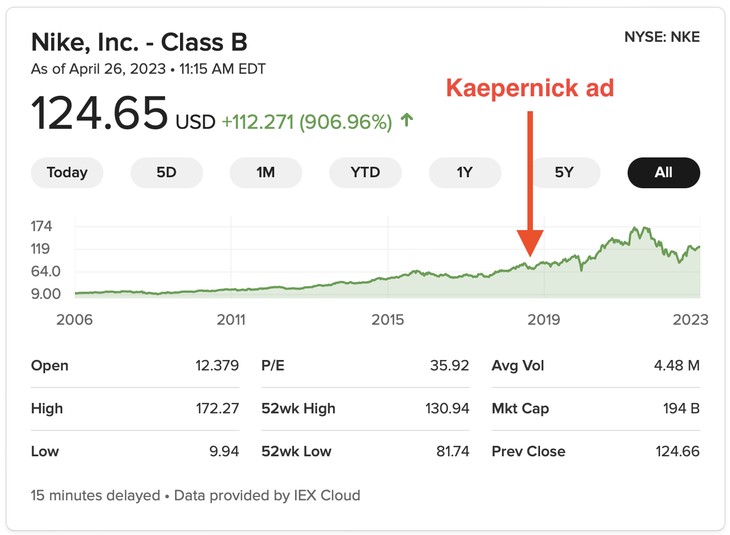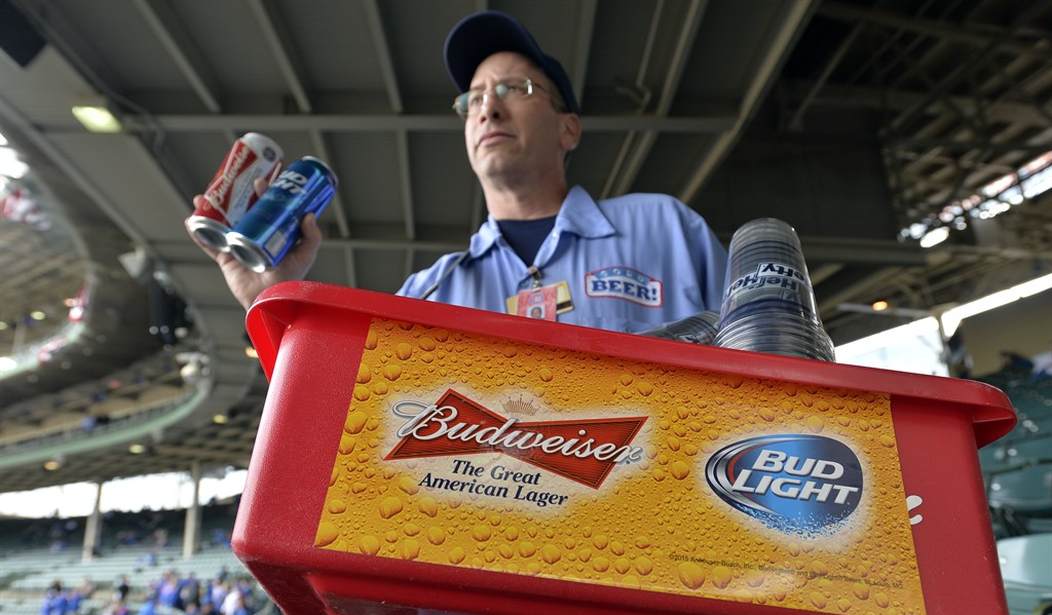“Get woke, go broke,” we conservatives love to say. But when we’re honest with ourselves, we know that this is seldom the case anymore. Almost all major corporations nowadays subscribe to DEI/ESG protocols. And they merrily make woke decisions all day long and seem only to prosper.
Remember when Nike made the detestable Colin Kaepernick a prominent figure in its 2018 advertising campaign? A mediocre football player, Kaepernick raised his profile by refusing to stand for the national anthem. Not only that, but Kaepernick’s hatred for law enforcement was such that he was known to wear socks on the gridiron that featured cartoon pigs wearing police hats. Imagine the uproar if the cops assigned to provide security for his games wore socks featuring cartoon monkeys in football helmets! But I digress.

We all assumed Nike’s goose was cooked when that ad campaign came out. I gleefully popped corn and loaded up the stock ticker. And initially, Nike took a hit. The New Yorker reported:
Kaepernick’s supporters hailed the ad for its boldness, but the negative reaction was swift and predictable. The Wall Street Journal reported that Nike stock fell nearly three per cent. On Twitter, irate critics posted images of burning Nike shoes … One meme features a photo of Pat Tillman, the former safety for the Arizona Cardinals, who quit football to join the Army after 9/11, and was killed in a friendly-fire incident in Afghanistan. The picture is paired with the caption from the Kaepernick ad.
It seemed like a slam dunk. But look around you: is Nike any less omnipresent or profitable today? The negative impact of the controversy was fleeting; Nike recovered in a couple of months and went on to dominate the market more than ever.

Nor is Nike the only frustrating example. Just take a gander at the garish parade of brands debasing themselves during Gay Ramadan (aka Pride Month) and then ask yourself how many of them are suffering because of it.
Also for our VIPs: Is Bud Light’s ‘Unmitigated Disaster’ the End of Woke Corporatism?
But Bud Light’s disaster feels different. The controversy, as you know, was touched off by woke Anheuser-Busch marketing executives’ decision to put trans superstar Dylan Mulvaney’s face on a can of their beer. It blew up in their faces harder than cracking a can of Bud Light that was just pulled out of a hot car and given a good shaking.
Sales of the iconic beer dropped off immediately, organically, and universally. No one needed to be told to boycott the brand; people simply didn’t want to drink a beer so intimately associated with transgenderism. It didn’t represent who they were.
A high schooler once told me a story that explains the phenomenon. In this student’s school, a display case in the main hallway had been given over to the LGBTQ club. The rainbow students had packed it with a veritable clown car of technicolor advocacy. The entire student body was forced to pass by the gaudy display numerous times a day whenever they changed classes. “And everybody knew,” disclosed the high schooler, “that you weren’t supposed to look at it when you walked by. Because if you looked at it, that meant you were gay.”
I enjoyed the schoolyard humor in that story when I heard it — very refreshing. But I could also relate, and the story stuck with me. And Bud Light is now “trans beer,” and if you drink it in public, then everybody knows you’re LGBTQ3.14159…
The bottom line is that Americans are generous and tolerant people. We love our gay friends and relatives, and we’re happy for them when they’re happy. But most of us are not gay ourselves (and we’re certainly not trans), and we don’t want corporations to try to make us gay. And once a corporation crosses that line — once a brand becomes known as a signal that the user is of a certain persuasion — it may not be able to come back.










